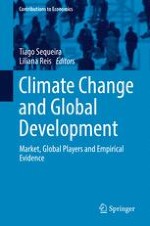2019 | OriginalPaper | Buchkapitel
The European Union as a Leading Environmental Player? A Critical Analysis on the Policy and Commitments Towards Global Development and Climate Change
verfasst von : Ana Isabel Xavier
Erschienen in: Climate Change and Global Development
Verlag: Springer International Publishing
Aktivieren Sie unsere intelligente Suche, um passende Fachinhalte oder Patente zu finden.
Wählen Sie Textabschnitte aus um mit Künstlicher Intelligenz passenden Patente zu finden. powered by
Markieren Sie Textabschnitte, um KI-gestützt weitere passende Inhalte zu finden. powered by
